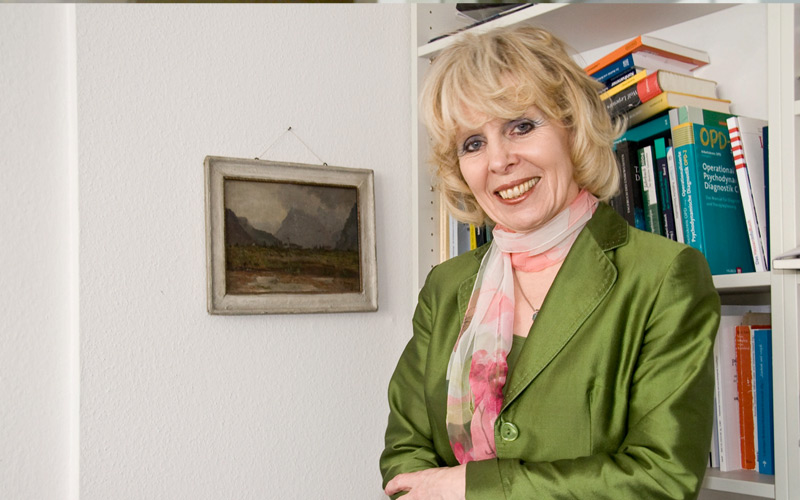“In my own two analyses, I had observed such transformations for me in a very impressive way. I started my own analysis after the traumatic death of my sister when I was 22 years old. At that time, I had a breakdown, and I suffered from severe depressive and psychosomatic symptoms and sleep disorders but also from terrible nightmares that haunted me almost every night. Fortunately, my two analyses did change my depressive and psychosomatic symptoms, but what was at least as important for me, subjectively, was the change in my dreams, including the manifest dream content. The nightmares became less frequent; I was hardly in the position of an observer anymore but actively involved in the dream event. I was less alone in the dream but accompanied by people close to me and was more often able to solve the problems and conflicts which arose in the dream. In addition, the dreams were no longer predominantly characterized by fear and death anxiety but a whole range of emotions emerged. Towards the end of my second analysis, I will never forget that I had the only dream of my life from which I woke up because I was laughing out loud.”

Prof. Dr. phil. Marianne Leuzinger-Bohleber
Frankfurt
Episode Description:
We begin with acknowledging the ambivalence that many analysts have towards research. It is seen as distant from the sharing of subjectivities that draw many to our field. Marianne honors the unique transference reliving and then remembering that is central to the analytic encounter and from that position suggests ways that it can be researched. She presents a patient whose manifest dreams were studied over the course of treatment along with his sleep laboratory data. She notes how the stability of the analyst’s presence is essential but not sufficient to maximize therapeutic benefit. We discuss the role of theory, the controversy over approaching the veridical past and the seductions of simplified treatments. Marianne closes by sharing her deep respect for the unconscious and how psychoanalysts are living in “rich times of pluralism.”
Our Guest:
Marianne Leuzinger-Bohleber, Prof. Dr. phil, director of the Sigmund-Freud-Institut in Frankfurt Germany (2001-2016), professor for psychoanalysis at the University of Kassel, Senior Research Fellow at the University Medicine in Mainz. She is a training analyst of the German Psychoanalytical Association (DPV) and the International Psychoanalytical Association (IPA). She has served as the Chair of the Research Subcommittees for Clinical, Conceptual, Epistemological and Historical Research of the IPA (2001-2009), Vice Chair for Europe of the Research Board der IPA (2010-2021); Chair of the IPA Subcommittee for Migration and Refugees 2018/19 and since then member of the committee. She received the Mary Sigourney Award 2016, the Haskell Norman Prize for Excellence in Psychoanalysis 2017, the Robert S. Wallerstein Fellowship (2022-2027) and the IPA’s Outstanding Scientific Achievement Award, 2023. Her research fields are clinical and extra-clinical research in psychoanalysis, psychoanalytic developmental research, prevention studies, interdisciplinary dialogue between psychoanalysis and literature, educational sciences and the neurosciences.
Linked Episode:
https://ipaoffthecouch.org/2019/07/13/episode-10-refugees-germany-psychoanalysis/
Recommended Readings:
Leuzinger-Bohleber, M. (2008): Biographical truths and their clinical consequences: Understanding ‚embodied memories‘ in a third psychoanalysis with a traumatized patient recovered from serve poliomyelitis. International Journal of Psychoanalysis 89: 1165-1187.
Leuzinger-Bohleber, M. (2015): Working with severely traumatized, chronically depressed analysands. In: The International Journal of Psychoanalysis Volume 96, Issue 3, June 2015, Pages: 611-636.
Bohleber, W., Leuzinger-Bohleber, M. (2016): The Special Problem of Interpretation in the Treatment of Traumatized Patients. In: Psychoanalytic Inquiry 36: 60-76, 2016.
Fischmann, T., Ambresin, G., Leuzinger-Bohleber, M. (2021): Manifest dreams in psychoanalytic treatment. A psychoanalytic outcome measure. Frontiers in Psychology, doi: 10,3389/fpsyg, 2021.678440.
Leuzinger-Bohleber, M., Donié, M., Wichelmann, J., Ambresin, G., & Fischmann, T. (2023). Changes in dreams – the development of a dream-transformation scale in psychoanalysis with chronically depressed, early traumatized patients. The Scandinavian Psychoanalytic Review, 46:1-2, 82-93. doi:10.1080/01062301.2023.2297116
Fischmann, T., and Leuzinger-Bohleber, M.: Dreams, Memories, and Trauma—A search for transformations in psychoanalysis (in press).
